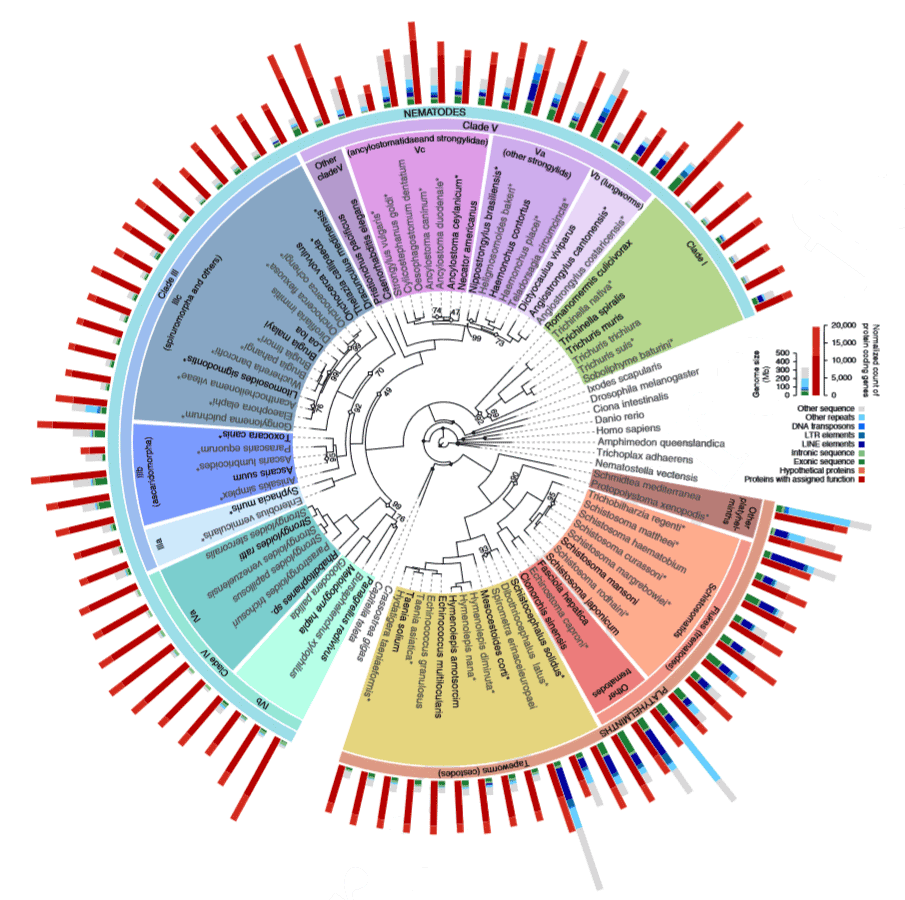Largest parasitic worm genetic study hatches novel treatment possibilities
The largest genomic study of parasitic worms to date has identified hundreds of thousands of new genes and predicted many new potential drug targets and drugs. The research from the Wellcome Sanger Institute, Washington University in St. Louis, the University of Edinburgh, and their collaborators will help scientists understand how these parasites invade us, evade the immune system and cause disease.

Parasitic worms cause some of the most neglected tropical diseases, including river blindness, schistosomiasis and hookworm disease, and blight the lives of over a billion people globally. Infections can last many years or even decades, leading to severe pain, massive physical disabilities, retarded development in children, and social stigma associated with deformity. Despite the huge health burden inflicted on many of the poorest countries of the world, there has been little investment in parasitic worm research.
To understand how worms can infest and live inside people, the researchers compared the genomes of 81 species of roundworms and flatworms, including 45 that had never been previously sequenced. Their analysis revealed almost a million new genes that had not been seen before, belonging to thousands of new gene families, and which had huge variations in how they were distributed between species.
The researchers found that some species of worms had enormous gene families to help them colonise the host gut, migrate through host tissue or digest food. Other species had many gene families that affect the host immune system to keep the worm hidden.
“Little is known about the biology of many parasitic worm species, so we used a broad comparison of their genomes to discover the most striking genetic differences between them. We have uncovered many new genes and gene families to help understand how the worms live and migrate inside us and other animals. This dataset will catapult worm research into a new era of discovery.”
Dr Matt Berriman Senior author from the Wellcome Sanger Institute
Anti-worm treatments have remained unchanged for years and are often inadequate. In addition, an over-reliance on just a few existing drugs may lead to drug resistance. To search for new interventions, the researchers mined the dataset of 800,000 worm gene sequences to predict new worm drug targets and anti-worm drugs. Making use of the ChEMBL database* of existing drugs and chemicals, they narrowed the list down to 40 high-priority drug targets in the worms, and hundreds of possible existing drugs or compounds.
“The spectrum of drugs available to treat worm infections is still very limited. We focussed our search by looking at existing drugs for human illnesses. This may provide a fast-track route to pinpointing existing drugs that could be repurposed for deworming.”
Dr Avril Coghlan Lead analyst from the Wellcome Sanger Institute
Further research could lead to a raft of new treatment possibilities to help improve the lives of the millions of people suffering from the neglected tropical diseases caused by these worms.
In addition to uncovering new genes and potential new deworming possibilities, the 81 genome sequences allow researchers to place each worm in the evolutionary tree of life, to help understand how parasites evolve.
“All the parasites evolved from free living ancestors, and comparing their genomes has shown the changes that happen when a species becomes a parasite. Parasites affect most of the natural world, and these genomes hold a record of how these fascinating animals – and their astounding biology – came to be.”
Professor Mark Blaxter An author from the University of Edinburgh
The parasite genomes are also providing clues into how worms avoid being attacked by our immune systems. This could help our understanding of the immune system itself and ultimately let us use the natural power of the immune system to improve human health.
“Parasitic worms are some of our oldest foes, and have evolved over millions of years to be expert manipulators of the human immune system. This study will lead to a better understanding of the biology of these important organisms, but could also help us better understand how our immune systems can be harnessed or controlled.”
Associate Professor Makedonka Mitreva Senior author from Washington University’s McDonnell Genome Institute
More information
Notes to Editors
*ChEMBL is a database of bioactive molecules with drug-like properties, at the EMBL European Bioinformatics Institute. https://www.ebi.ac.uk/chembl/
Publication:
Avril Coghlan et al. (2018) Comparative genomics of the major parasitic worms. Nature Genetics DOI: 10.1038/s41588-018-0262-1
Funding:
This work was supported by Wellcome, UK Medical Research Council, US National Institutes of Health (NIH), National Institute of Allergy and Infectious Diseases, National Institute of General Medical Sciences, and other funders. Please see the paper for full list of funders.
Selected websites
Washington University’s McDonnell Genome Institute
University of Edinburgh
The University of Edinburgh’s Institute of Evolutionary Biology https://www.ed.ac.uk/biology and Infectious Diseases network https://www.ed.ac.uk/edinburgh-infectious-diseases conduct world-leading research in infectious disease biology and medicine. Genome sequencing in Edinburgh was delivered by Edinburgh Genomics, an open-access academic genomics facility that has core support The Natural Environment Research Council (NERC).
Wellcome Sanger Institute
The Wellcome Sanger Institute is one of the world’s leading genome centres. Through its ability to conduct research at scale, it is able to engage in bold and long-term exploratory projects that are designed to influence and empower medical science globally. Institute research findings, generated through its own research programmes and through its leading role in international consortia, are being used to develop new diagnostics and treatments for human disease. To celebrate its 25th year in 2018, the Institute is sequencing 25 new genomes of species in the UK. Find out more at www.sanger.ac.uk or follow @sangerinstitute on Facebook, Twitter and LinkedIn.
Wellcome
Wellcome exists to improve health for everyone by helping great ideas to thrive. We’re a global charitable foundation, both politically and financially independent. We support scientists and researchers, take on big problems, fuel imaginations and spark debate. wellcome.org


